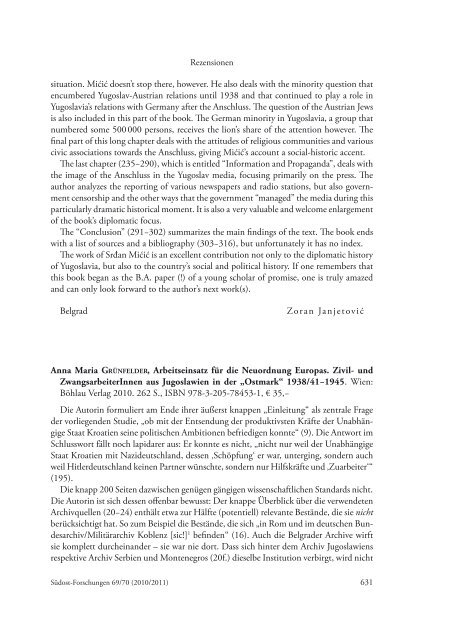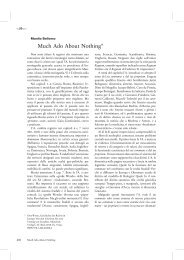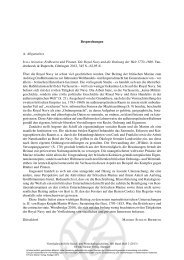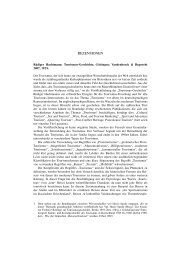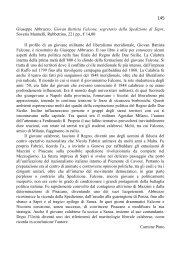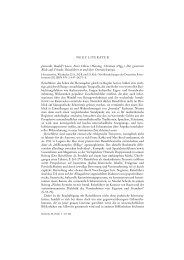69/70 (2010/2011) - Recensio.net
69/70 (2010/2011) - Recensio.net
69/70 (2010/2011) - Recensio.net
Sie wollen auch ein ePaper? Erhöhen Sie die Reichweite Ihrer Titel.
YUMPU macht aus Druck-PDFs automatisch weboptimierte ePaper, die Google liebt.
Rezensionen<br />
situation. Mićić doesn’t stop there, however. He also deals with the minority question that<br />
encumbered Yugoslav-Austrian relations until 1938 and that continued to play a role in<br />
Yugoslavia’s relations with Germany after the Anschluss. The question of the Austrian Jews<br />
is also included in this part of the book. The German minority in Yugoslavia, a group that<br />
numbered some 500 000 persons, receives the lion’s share of the attention however. The<br />
final part of this long chapter deals with the attitudes of religious communities and various<br />
civic associations towards the Anschluss, giving Mićić’s account a social-historic accent.<br />
The last chapter (235−290), which is entitled “Information and Propaganda”, deals with<br />
the image of the Anschluss in the Yugoslav media, focusing primarily on the press. The<br />
author analyzes the reporting of various newspapers and radio stations, but also government<br />
censorship and the other ways that the government “managed” the media during this<br />
particularly dramatic historical moment. It is also a very valuable and welcome enlargement<br />
of the book’s diplomatic focus.<br />
The “Conclusion” (291−302) summarizes the main findings of the text. The book ends<br />
with a list of sources and a bibliography (303−316), but unfortunately it has no index.<br />
The work of Srđan Mićić is an excellent contribution not only to the diplomatic history<br />
of Yugoslavia, but also to the country’s social and political history. If one remembers that<br />
this book began as the B.A. paper (!) of a young scholar of promise, one is truly amazed<br />
and can only look forward to the author’s next work(s).<br />
Belgrad Zoran Janjetović<br />
Anna Maria grünfelder, Arbeitseinsatz für die Neuordnung Europas. Zivil- und<br />
ZwangsarbeiterInnen aus Jugoslawien in der „Ostmark“ 1938/41−1945. Wien:<br />
Böhlau Verlag <strong>2010</strong>. 262 S., ISBN 978-3-205-78453-1, € 35,−<br />
Die Autorin formuliert am Ende ihrer äußerst knappen „Einleitung“ als zentrale Frage<br />
der vorliegenden Studie, „ob mit der Entsendung der produktivsten Kräfte der Unabhängige<br />
Staat Kroatien seine politischen Ambitionen befriedigen konnte“ (9). Die Antwort im<br />
Schlusswort fällt noch lapidarer aus: Er konnte es nicht, „nicht nur weil der Unabhängige<br />
Staat Kroatien mit Nazideutschland, dessen ‚Schöpfung‘ er war, unterging, sondern auch<br />
weil Hitlerdeutschland keinen Partner wünschte, sondern nur Hilfskräfte und ‚Zuarbeiter‘“<br />
(195).<br />
Die knapp 200 Seiten dazwischen genügen gängigen wissenschaftlichen Standards nicht.<br />
Die Autorin ist sich dessen offenbar bewusst: Der knappe Überblick über die verwendeten<br />
Archivquellen (20−24) enthält etwa zur Hälfte (potentiell) relevante Bestände, die sie nicht<br />
berücksichtigt hat. So zum Beispiel die Bestände, die sich „in Rom und im deutschen Bundesarchiv/Militärarchiv<br />
Koblenz [sic!] 1 befinden“ (16). Auch die Belgrader Archive wirft<br />
sie komplett durcheinander – sie war nie dort. Dass sich hinter dem Archiv Jugoslawiens<br />
respektive Archiv Serbien und Montenegros (20f.) dieselbe Institution verbirgt, wird nicht<br />
Südost-Forschungen <strong>69</strong>/<strong>70</strong> (<strong>2010</strong>/<strong>2011</strong>) 631


